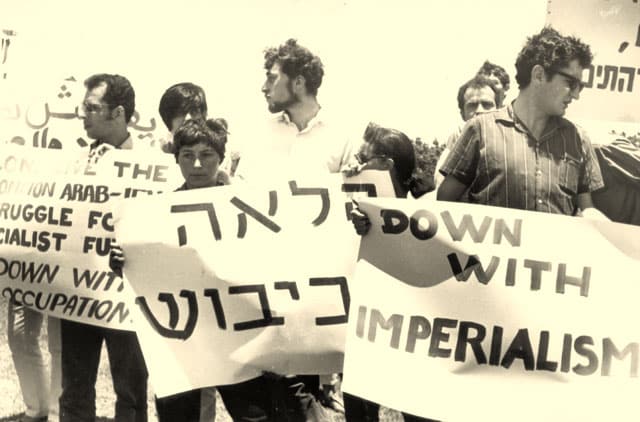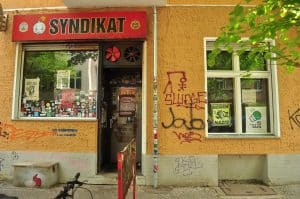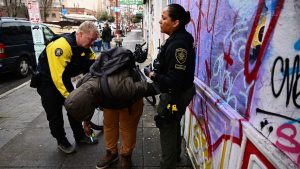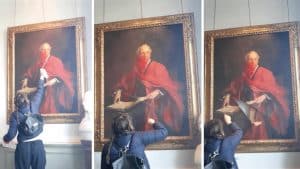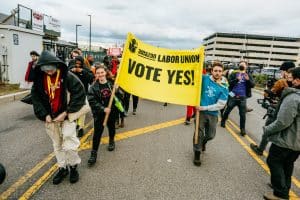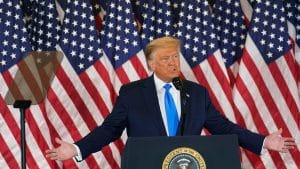In the last weeks, over 1,000 Israelis and more than three times as many Palestinians have been killed. What is the source of all the fighting? The conflict is often presented as an ancient battle between religions. Benjamin Netanyahu, for example, spoke of a “struggle between the children of light and the children of darkness,” while Hamas sees this as a struggle between Muslims and Jews.
In reality, however, Muslims, Christians, and Jews lived in relative peace in Palestine for centuries. It was only in the age of imperialism, and especially with the beginning of Zionist colonization in the late 1800s, that this so-called “eternal” conflict began.
We are often told that all Jews are Zionists, and that anyone who opposes Israel must be an antisemite. This has never been true. There have always been anti-Zionists in the diaspora and in Israel, and they have joined in struggle with Palestinians for peaceful coexistence.
Early Socialist Anti-Zionists
As the ideas of Zionism cohered at the end of the 1800s, most Jewish workers found the idea of colonizing Palestine ridiculous. Proletarian Jews in Eastern Europe sang songs mocking “Oy, Ir Narishe Tsionistn” (“You Foolish Little Zionists”). The most famous anti-Zionist workers’ organization was the General Jewish Workers League, better known simply as the Bund. Rather than seeking an end to oppression in a far-away land, they wanted to fight for liberation wherever they happened to be living, alongside all workers. They called this “doikayt” or “hereness.”
Rosa Luxemburg, one of history’s most famous Jewish revolutionaries, explained why she was interested in all human suffering, not just Jewish suffering: “I am just as much concerned with the poor victims on the rubber plantations of Putumayo, the black people in Africa with whose corpses the Europeans play catch,” she wrote to a friend. “I have no special place in my heart for the ghetto. I feel at home in the entire world wherever there are clouds and birds and human tears.”
The Bund was not exceptional. Socialists and communists of many stripes opposed Zionism. Leon Trotsky called the Zionist congress of 1903 a “pitiful and empty” event led by a “shameless adventurer.” Besides bourgeois Zionists like Herzl, there were also “socialist Zionists” who proposed colonization of Palestine, but on a socialist basis. Socialist Zionism was the basis for organizations like Poale Zion and Hashomer Hatzair. Already in the early 1900s, Jewish Marxists pointed out that this “socialist Zionism” meant class collaboration with the Jewish bourgeoisie and as well as support for imperialism and colonialism — it would only lead to new national conflicts with the people of Palestine, and also to new antisemitism. Karl Kautsky, for example wrote that Jewish workers should aim for “revolution in Russia” rather than emigration to Palestine.1For the story of a socialist Zionist youth activist who turned to Trotskyism, see: Nathaniel Flakin, Martin Monath: A Jewish Resistance Fighter Among Nazi Soldiers (London: Pluto, 2019), presented in this interview.
Palestine Communist Party
The first communist organization in Palestine was founded in 1919 by Jewish immigrants. The Socialist Workers Party (MPS in Hebrew) was created after a split in the worldwide socialist Zionist organization Poale Zion. The left wing of Poale Zion, inspired by the October Revolution in Russia, became communist. Some Jewish proletarians, after arriving in Palestine, realized that the goal of an exclusively Jewish homeland in Palestine, even a “socialist” one, was a reactionary utopia. They took up the fight against British imperialism and called for the unity of Jewish and Palestinian workers — their goal was a “Soviet Palestine” for all peoples. After a series of splits and fusions, the Palestine Communist Party was founded in 1923. Its official name was in Yiddish — “Palestinische Komunistische Partei” — not in Hebrew, as they preferred the language of the diaspora to that of the new state in formation.
Despite promising beginnings, the PKP was destroyed by Stalinism — not just politically, but also physically. The Stalinized Comintern imposed constant zig zags, and the PKP was instructed to give uncritical support to bourgeois Arab nationalism. In the second half of the 1930s, Stalin revived antisemitism in the Soviet Union with the Moscow Trials. Former leaders of the October Revolution, many of them Jewish, were accused of being spies and traitors who had hid their Jewish names. In the course of the Great Terror, most of the PKP leaders were annihilated, along with many other Jewish communists.2Leopold Trepper was one of the few PKP leaders to survive the purges, and went on to serve as a heroic spy against the Nazis. See: Leopold Trepper, The Great Game — Memoirs of the Spy Hitler Couldn’t Silence (New York: McGraw-Hill, 1977).
Stalin later decided to support the creation of the state of Israel. This was not just a diplomatic maneuver — Stalinist Czechoslovakia provided weapons to the Zionist militias in order to carry out ethnic cleansing. At the same time, in the Soviet Union and its satellite states, Stalin carried out terrible antisemitic campaigns and show trials. In the new state of Israel, the Stalinized communist party, now called Maki, not only supported Zionism — they played a key role in acquiring weapons to commit the Nakba3Joel Beinin, Was the Red Flag Flying There? Marxist Politics and the Arab-Israeli Conflict in Egypt and Israel 1948-1965 (Oakland, University of California Press, 1990).
Revolutionary Communist League of Palestine
Palestinian communists who opposed Stalinism regrouped as the Revolutionary Communist League. This was mostly made up of Jewish workers — some who were born in Palestine, and others who had fled from fascism in Germany. The RCL opposed the imperialist plans for partitioning Palestine, and called for a socialist homeland for both Arabs and Jews. RCL activists like Jakob Moneta organized joint trade unions for Arab and Jewish workers, and for this “crime” they were interned by the British colonial authorities.
The RCL was not a purely Jewish organization, however. After the Hitler-Stalin pact of 1939, the Palestinian communist Jabra Nicola joined the RCL and remained a Trotskyist for the rest of his life. After World War II, a number of RCL activists returned to Europe and became leaders of the revolutionary socialist movement. Yigael Gluckstein took the pseudonym Tony Cliff and led the Socialist Workers Party (SWP) in Great Britain. Jakob Moneta and Rudi Segall became leading members of the International Marxist Group (GIM) in Germany. After the horrors of the Nakba, however, the RCL largely collapsed, even if individual activists maintained their socialist convictions.
Matzpen — The Israeli Socialist Organization
1962 saw the birth of a New Left in Israel, when critical young activists were expelled from Maki, the pro-Soviet communist party. They founded the Israeli Socialist Organization, better known by the name of their magazine, Matzpen (Hebrew for “Compass”). Matzpen united young people politicized in 1967-68 with two veteran Trotskyists in Palestine, the previously mentioned Jabra Nicola and Jakob Taut.
Taut deserves a short biography: he grew up as a worker in Berlin and had to flee to Palestine in 1934 — He had never supported Zionism, but he could not get a visa from anywhere else. Taut worked at the oil refinery in Haifa, and in 1948, a Zionist terrorist group placed a bomb there that killed half a dozen Arab workers. In response, an angry mob began massacring Jews. Taut survived, severely injured, buried under the bodies of his colleagues. This horrific trauma did not destroy Taut’s internationalist spirit — he remained convinced that by fighting against Zionism, Jewish and Palestinian workers could build a future together. 4For more on Taut, see: Alain Brossat and Sylvie Klingberg, Revolutionary Yiddishland: A History of Jewish Radicalism (London: Verso, 2016).
Matzpen was always a tiny group, but they spoke out clearly against the occupation of more Palestinian territories in 1967, so everyone in Israel — including the Prime Minister — was talking about them. They also helped set up Israeli Black Panthers, a group of young Mizrahi — Jews of North African or Middle Eastern descent — activists fighting against discrimination.
Matzpen activists went on speaking tours through Europe and the U.S., and thus helped the international Left understand the contradictions inside Israel. Matzpen worked together with the PLO and especially with left-wing Palestinian groups like the DFLP, striving to build alliances between the Palestinian liberation movement and oppressed sectors in Israel.
In the mid-1970s, the group split into two sections, with the Tel Aviv branch following an “undogmatic” path, while the Jerusalem branch aligned more closely with Trotskyism. While both were called Matzpen, the latter took on the old name RCL as well. During the First Intifada, RCL leader Michael Warschawski was condemned to three years in prison for his work supporting Palestinian activists.5A history of Matzpen still needs to be written. Besides the spectacular documentary Matzpen, Anti Zionist Israelis from 2003, there is an enormous multilingual digital archive at matzpen.org. Warschawki published his autobiography 20 years ago — Michael Warschawki, On the Border (Cambridge, MA: South End Press, 2005) — but it is rather sparse with details about Matzpen. A German scholar wrote a lengthy book: Lutz Fiedler, Matzpen: A History of Israeli Dissidence (Edinburgh: University of Edinburgh Press, 2020). While this contains many interesting details, as Matan Kaminer points out in the Tel Aviv Review of Books, and I point out in Klasse Gegen Klasse, Fiedler employs a cynical and paternalistic analysis in which the socialist revolutionaries end up helping consolidate an Israeli nation state.
In 2003, this spectacular documentary was published about Matzpen:
Jewish Anti-Zionist Activism Today
Today there are still many anti-Zionists in Israel and throughout the world. During the massive “democracy” protests of the last year (which in its majority never questioned Israel’s ethnonationalist character), there was always an “Anti-Apartheid Bloc” of dozens or even hundreds of activists demanding democracy for Palestinians too.
Many of the left-wing groups in Israel are not really anti-Zionist. Maki, the Communist Party, was reformed in the 1960s, but it’s non-Zionist rather than anti-Zionist. Ma’avak, the Socialist Struggle Movements, was founded in the 1990s and claims the Trotskyist tradition, but has the same problem. These groups think that some kind of “two-state solution” could solve the conflict caused by imperialism.
We have major political and strategic differences with many of the socialist organizations in Israel. But it is important to show that there have always been anti-Zionist Jews. Claims that all Israelis or even all Jews support Zionism have never been true, and they are not true today. We believe that the only solution to the “eternal” conflict is to create a socialist Palestine, with democratic rights for all its inhabitants, as part of a socialist federation of the Middle East. As the Palestinian Trotskyists said back in 1948:
In order to solve the Jewish problem, in order to free ourselves from the burden of imperialism, there is only one way: the common class war with our Arab brothers; a war which is an inseparable link of the anti-imperialist war of the oppressed masses in all the Arab East and the entire world.
Notes
| ↑1 | For the story of a socialist Zionist youth activist who turned to Trotskyism, see: Nathaniel Flakin, Martin Monath: A Jewish Resistance Fighter Among Nazi Soldiers (London: Pluto, 2019), presented in this interview. |
|---|---|
| ↑2 | Leopold Trepper was one of the few PKP leaders to survive the purges, and went on to serve as a heroic spy against the Nazis. See: Leopold Trepper, The Great Game — Memoirs of the Spy Hitler Couldn’t Silence (New York: McGraw-Hill, 1977). |
| ↑3 | Joel Beinin, Was the Red Flag Flying There? Marxist Politics and the Arab-Israeli Conflict in Egypt and Israel 1948-1965 (Oakland, University of California Press, 1990). |
| ↑4 | For more on Taut, see: Alain Brossat and Sylvie Klingberg, Revolutionary Yiddishland: A History of Jewish Radicalism (London: Verso, 2016). |
| ↑5 | A history of Matzpen still needs to be written. Besides the spectacular documentary Matzpen, Anti Zionist Israelis from 2003, there is an enormous multilingual digital archive at matzpen.org. Warschawki published his autobiography 20 years ago — Michael Warschawki, On the Border (Cambridge, MA: South End Press, 2005) — but it is rather sparse with details about Matzpen. A German scholar wrote a lengthy book: Lutz Fiedler, Matzpen: A History of Israeli Dissidence (Edinburgh: University of Edinburgh Press, 2020). While this contains many interesting details, as Matan Kaminer points out in the Tel Aviv Review of Books, and I point out in Klasse Gegen Klasse, Fiedler employs a cynical and paternalistic analysis in which the socialist revolutionaries end up helping consolidate an Israeli nation state. |


